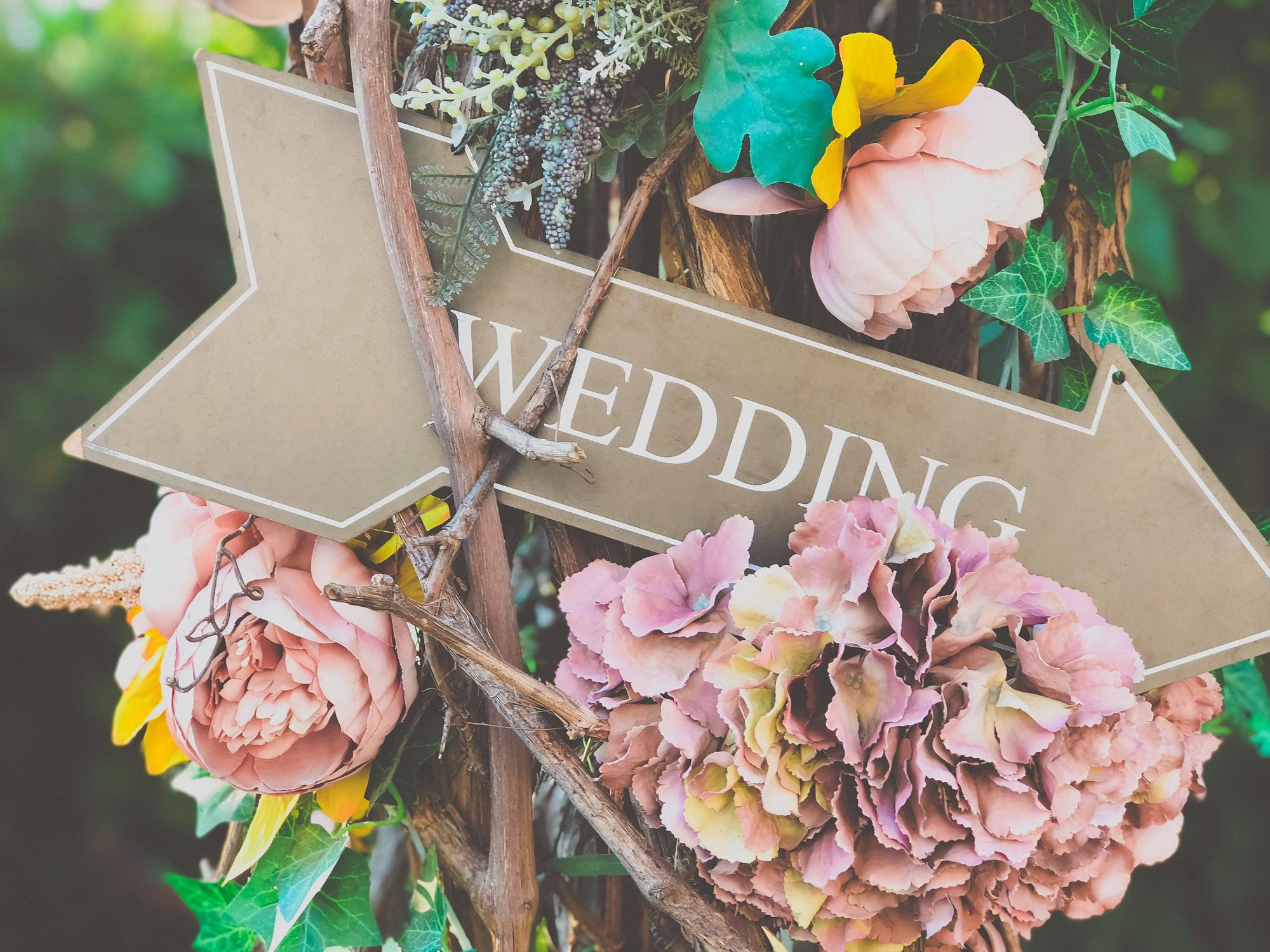My big fat cancelled wedding: How to navigate the quagmire of rescheduled nuptials and insurance claims
Where to begin when the day you spent months planning is taken away from you. Sarah Young speaks to the experts about navigating your options in a post-lockdown landscape


White satin dresses, jam jars filled with wildflowers and jugs of Pimms: the mention of a wedding day conjures images of sun-dappled fields and sprawling marquees in which revellers dance and lovers embrace.
For 2020, of course, all that has changed. The nationwide lockdown as a result of the Covid-19 pandemic has seen the nuptials of thousands of couples across the country shift as they face the economic, social, and logistical challenges of postponing their weddings to a later date or cancelling them altogether. Thousands of engaged couples who have spent months saving and planning will now likely spend their wedding dates behind closed doors, separated from friends and family.
According to wedding planning app Bridebook, approximately 64 per cent of 2020 weddings have been impacted by coronavirus so far, either due to postponements, cancellations, or travel logistics, with an estimated loss of £87.5bn to the global wedding industry.
Although lockdown is gradually easing - with Boris Johnson announcing family and friends can meet in groups of six (if they remain outside and at a social distance) from 1 June, big gatherings are still off the table. In addition, places of worship, and venues like hotels, have not yet reopened. Even Princess Beatrice has had to call off her wedding, which was scheduled for 29 May.
So until we know more about lockdown fully ending, what are the options for betrothed couples?
To postpone or to cancel?
A survey conducted by wedding planning website Hitched, showed that among couples with wedding dates between March and June 2020, 76 per cent had planned to reschedule their wedding day, with one in four moving their reception to a later date in 2020, and an even higher proportion (44 per cent) shifting to 2021.
A number of industry insiders, including luxury planners, venue owners and independent vendors, have explained that there appears to be two schools of thought among couples when it comes to choosing a new date. Kat Williams, founder of Rock n Roll Bride magazine, tells The Independent that there are “those that are pushing back to the autumn (October onwards) and others that are keeping the same date but just moving it exactly a year later”.
Most of the industry insiders The Independent spoke to recommended couples opt for the latter option. This is because although some restrictions may be eased over the coming weeks and months, registrars across the country have said they will only allow three to five people at ceremonies until the at least end of August 2020, which includes the registrar or priest, the bride, the groom and two witnesses.
“It’s extremely tough emotionally to deal with moving your wedding date more than once so just accepting the wedding date you had planned isn’t going to happen then and moving it much further away is the best plan,” recommends Amy Cross, creative director at event planning company Ivy & Gold Studio.
Elspeth Tull, founder of floral design and creative planning studio Blume, agrees, adding that couples who rebook for later this year are taking a "huge risk” and could be forced to move their wedding date more than once if the government does not permit mass gatherings in the coming months – a decision she says would be “very traumatic and potentially costly”.
Of course for some people the financial implications of postponing a wedding to any date may be too much to consider. Wedding plans you started making years ago may no longer be financially viable in light of the pandemic - especially when you have several months, or even a year, to worry about the spiralling debt. This is particularly true for couples experiencing furlough or job insecurity: currently one in four UK workers is furloughed from their job.
The logistics of postponement
While postponements used to be a rarity in the world of weddings, Emma Joy, a luxury wedding planner based in London, is among one of many industry experts The Independent has spoken to who are currently helping the majority, if not all, their clients move their big day.
The first thing that you should do is contact your insurance company (if you have one), says Joy, to discuss your situation as they will be able to provide some insight into your what your policy covers and how you can ensure you don’t invalidate it.
Your venue should be your next port of call in order to ascertain their approach to postponing, which is likely to vary depending on when you’re getting married and individual circumstances. If postponing is an option, ask if what dates are available and if they are able to hold one for you while contact your vendors.
Next, call each of your suppliers to let them know that you’re considering moving your wedding. Ask them if they are available on the dates you have been offered and be sure to check their policy regarding charges for rebooking. Very few suppliers are charging couples to postpone, however you may find that some request for their original payment schedules to be honoured. You will have to try and prioritise the suppliers who mean the most to you.
Then, all that’s left to do is confirm the new date with your venue. But as the number of postponements begin to outweigh the number of weekends available, the options available to couples will naturally narrow.

Guests can expect to be bombarded with mid-week invites, or couples should expect to be flexible with weekday dates if they want to stand a better chance of securing the venue and suppliers they wanted in the first place. Similarly, opting for a weekday is one of the best ways to save money, with many venues offering a separate rate for weekend and weekday hire.
“We are already seeing a huge shift trend towards more weekday and off-season winter weddings,” Grace Newey, community specialist at Bridebook explains. “Within the wedding industry, the trend for Thursday, Friday, and Sunday weddings has been growing, and as a suitable solution for many couples, the trend is set to explode in 2021.”
Once you have a new date set communicate this with your suppliers via email so that you have written confirmation and inform your insurance company.
Cancellation: Know your rights
If cancellation is your only option, this might be the case for couples experiencing financial difficulty as a result of coronavirus, the process can be long and frustrating. Reports of couples struggling to get their money back or being charged cancellation and postponement fees are not uncommon.
In fact, so many couples have found themselves in similar predicaments that last week the Competition and Markets Authority (CMA) launched an investigation into complaints about coronavirus-related cancellations, which includes weddings and events, and has warned that anyone failing to provide because of the Covid-19 pandemic could face court action.
“The CMA’s taskforce has seen increasing numbers of complaints in relation to cancellations and refunds which, since the beginning of April, account for four out of five complaints being received,” a spokesperson for the watchdog said. “This includes high numbers of complaints in relation to weddings, which is why weddings is a sector of particular concern for the CMA.”
So, what are your rights when it comes to getting a refund?
According to the CMA, where a contract is not performed as agreed, consumer protection law should allow consumers to obtain a refund. In particular, for most consumer contracts, the CMA expects a consumer to be offered a full refund in the following circumstances.
It says: “A business has cancelled a contract without providing any of the promised goods or services no service is provided by a business, because this is prevented by restrictions that apply during the current lockdown. Or a consumer cancels, or is prevented from receiving any services, because lockdown restrictions mean they are not allowed to use the services they contracted for.”
Adam French, a consumer rights expert says that while couples should be entitled to get back what they have paid if a venue cancels, they may not be guaranteed a full refund as the company may make deductions for services they have already provided.
Similarly Alex Kennedy, a solicitor at commercial law firm Gannons, explains that it can be difficult to enforce.
“If you decide to cancel, the venue will normally be entitled to retain a portion of the deposit to cover costs already incurred,” Kennedy says. “The contract may also include a cancellation fee, although this will only be payable if it is not unfair. If a venue does retain a deposit or charges a cancellation fee, you should ask for a breakdown of their costs, as it is likely that the only sums they are entitled to keep are those which cover their expenses.”

Insurance: Read the small print
Many couples are advised to sign up for wedding insurance as soon as they start planning their wedding as doing so protects irrecoverable deposits or fees paid up front should something go wrong. Afterall who could have predicted we would spend 2020 locked in our homes?
But, despite insurance being to protect against unforeseen circumstances, many couples are finding the smallprint of their wedding insurance policy means it does not cover coronavirus.
Katie Watts, a consumer expert at MoneySavingExpert.com, says that while the CMA’s advice is helpful consumers have no way of enforcing them if a company simply says no, with many citing loopholes contained within the small print of policies which state claims arising directly or indirectly from a government regulation or act are excluded.
Steven Wardlaw, a lawyer and chairman of Emerald Life Insurance, explained that while his company is taking coronavirus-related claims, it is not accepting any that result from a cancellation caused by government advice, such as the current lockdown.
“We would always exclude government actions from being insured events, as we do with other policies,” he said. “It is not just relating to this specific outbreak, although it has had a disproportionate effect here.” Unfortunately for couples - many other companies will be applying the same rules. So what do you do if your insurer won’t pay up?
What if your insurer or venue won’t pay up?
Since 10 March, Citizens Advice has dealt with nearly 1,000 queries regarding wedding cancellations due to coronavirus and is urging any couples who have failed to resolve disputes with wedding vendors or insurers to contact the bureau’s helpline for legal advice.
Similarly, the CMA states any company behaving unfairly during the outbreak can be reported online.
Another option for couples seeking reimbursement who have placed deposits using a credit card is to contact their provider or bank to try and get money back using Section 75 of the Consumer Credit Act, which states that “a credit card company is jointly and severally liable for any breach of contract or misrepresentation by the retailer or trader”. The act can be applied to anything purchased between the value of £100 and £30,000 on a credit card.
If a payment card or wedding insurance query is still not resolved, Citizens Advice adds that couples can make a formal complaint to Trading Standards or the Financial Ombudsman Service – an independent adjudicator which will look at both sides and settle on a decision.
Similarly, anyone due to get married abroad or go on a honeymoon in the coming months, is advised to check the Foreign and Commonwealth Office website for further information.
Looking to the future
Having what is considered to be one of the biggest days of your life suddenly associated with a lot of extra stress and sadness can be difficult to overcome but Williams suggests that couples try and remember why they decided to get married in the first place.
“It’s not about the big, fancy wedding, the dress or the party – it’s about committing your lives to each other and marking the beginning of a whole new adventure,” she explains.
“At the end of the day, the most important thing is that you are happy and healthy and everyone will be there to celebrate with you when it finally happens. And goodness, isn’t it going to be one hell of a story to tell your grandchildren?”
Sarah Allard, editor at Hitched, agrees, adding that couples who have been forced to rethink their plans could find other ways to celebrate their initial wedding date together.
“If your wedding date is coming up, celebrate it at home. Get dressed up, pop the champagne, crack out the wedding playlist and arrange a video call with your friends and family,” she says.
‘You could even write some vows to each other to read in front of your nearest and dearest. It’s the perfect way to celebrate the original date and look forward to your future wedding day.”
Join our commenting forum
Join thought-provoking conversations, follow other Independent readers and see their replies
Comments